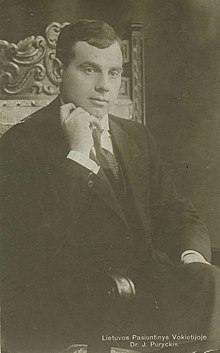Juozas Purickis | |
|---|---|
 | |
| Minister of Foreign Affairs | |
| In office 19 June 1920 – 12 December 1921 | |
| Prime Minister | Kazys Grinius |
| Preceded by | Augustinas Voldemaras |
| Succeeded by | Vladas Jurgutis |
| Personal details | |
| Born | 19 April 1883 Petrošiškės, Vilna Governorate, Russian Empire |
| Died | 25 October 1934 (aged 51) Kaunas, Lithuania |
| Nationality | Lithuanian |
| Political party | Lithuanian Christian Democratic Party |
| Alma mater | Kaunas Priest Seminary Saint Petersburg Roman Catholic Theological Academy University of Fribourg |
| Occupation | Diplomat, journalist |
Juozas Purickis (sometimes Juozas Puryckis; often used pen name Vygandas; 1883 – 1934) was a prominent diplomat and journalist in interwar Lithuania and served as the Minister of Foreign Affairs from June 1920 to December 1921, as well as the acting Prime Minister of Lithuania for two months at the end of 1921 during the leave of absence of Prime Minister Kazys Grinius
Purickis studied at the Kaunas Priest Seminary and Saint Petersburg Roman Catholic Theological Academy. He was ordained a Roman Catholic priest, but never practiced or performed pastoral work. He married in 1926 and was officially defrocked in 1929. He continued his studies at the University of Fribourg in Switzerland and in 1916 earned his doctorate of theology with a thesis on the Reformation in Lithuania. During World War I, he joined the efforts to establish independent Lithuania – he worked at the Lithuanian Information Bureau established by Juozas Gabrys, raised money for the Lithuanian prisoners of war and war refugees, attended the Lithuanian conferences in Switzerland. Together with Konstantinas Olšauskas, Purickis attended Vilnius Conference and presented on the German proposal to establish Kingdom of Lithuania. In 1918–1920, Purickis worked as Lithuanian diplomatic representative in Berlin, first as a deputy of Jurgis Šaulys, and played a key role in the election of Wilhelm Karl, Duke of Urach, as King Mindaugas II of Lithuania, and was co-opted by the Council of Lithuania. Purickis as a delegate of the Lithuanian Christian Democratic Party was elected to the Constituent Assembly of Lithuania which convened in May 1920. Next month, he became Minister of Foreign Affairs in the government of Prime Minister Kazys Grinius. He had to deal with the issue that shaped the entire interwar foreign policy of Lithuania – the loss of Vilnius Region to the Second Polish Republic in the Żeligowski's Mutiny in October 1920 and the subsequent ineffectual mediation efforts of the League of Nations. During his tenure, Lithuania gained international recognition and became a full member of the League of Nations.
On December 12, 1921, Purickis resigned due to a corruption scandal, the so-called saccharin case. Lithuanian counterintelligence had seized three train cars that had been traveling under a diplomatic exemption heading to the Soviet Union, and investigated their cargo. Two cars contained donated food (sugar and flour) for the victims of the Russian famine of 1921–22, but the third contained various black market items, including almost 10 tonnes (22,000 lb) of saccharin, to be sold for profit. Purickis and three other men were investigated, put on trial, and acquitted in February 1925. While the case was ongoing, Purickis lived mostly in Germany helping the Lithuanian government with the Klaipėda Revolt and trade negotiations with Germany and Sweden. He also started contributing articles, mostly on economic developments and current political affairs, to the Lithuanian press. After the acquittal, he returned to Lithuania and rejoined the Ministry of Foreign Affairs as director of the Economic Department and later Law–Administrative Department, but resigned when his party withdrew from the government in May 1927. Purickis then devoted his life to journalism and other public work. He was editor of the official daily Lietuva (1925–1930) and magazine on economy Tautos ūkis (since 1930) and author of numerous articles in Lietuvos aidas, Trimitas, Vairas, Mūsų Vilnius. He was chairman of the Lithuanian Journalists' Union from its establishment in 1929 to his death. He was an active member of the Lithuanian Riflemen's Union and a board member of the League for the Liberation of Vilnius as well as of many different societies, often working on international integration and collaboration.